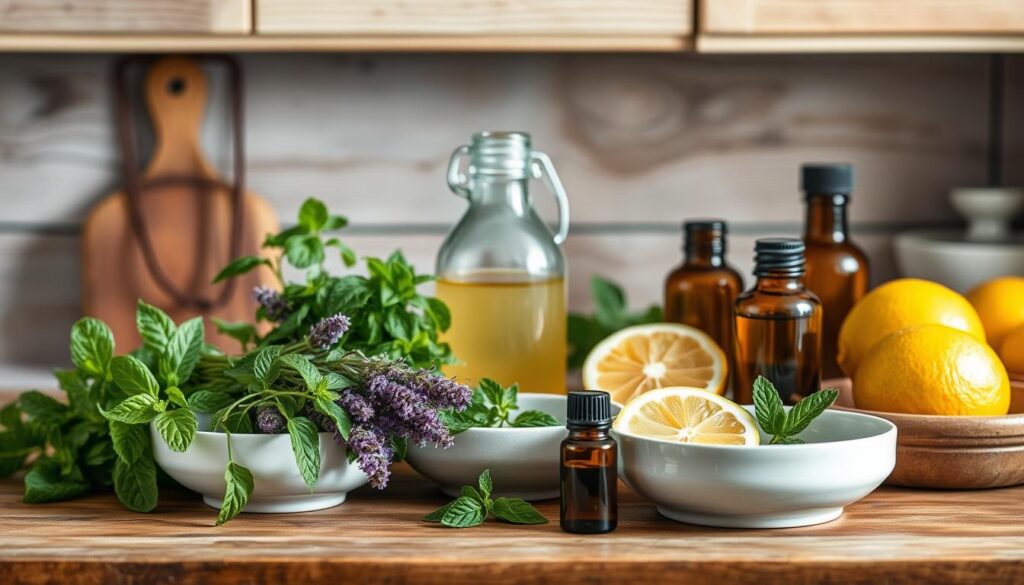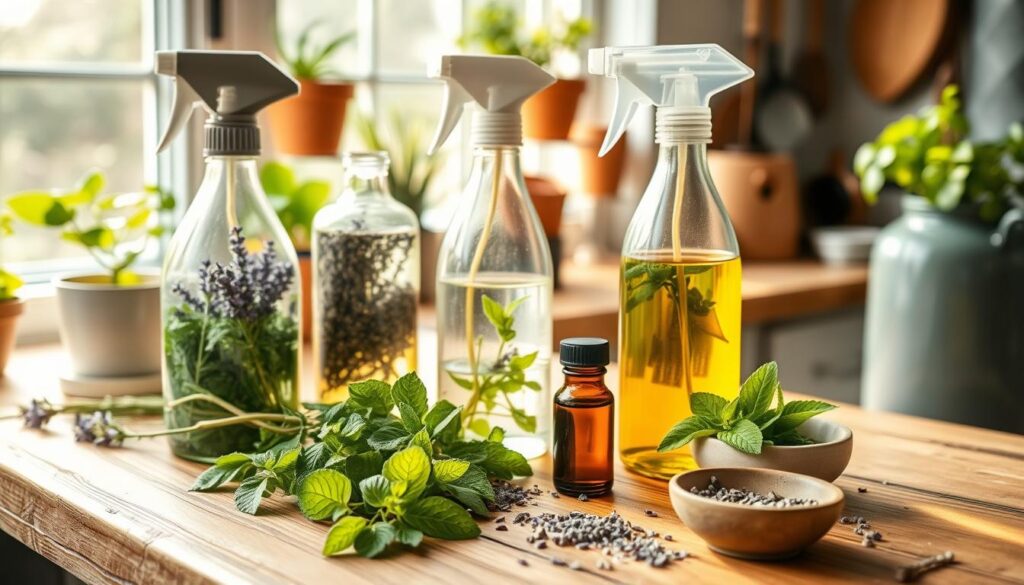Are you tired of swatting away pesky flies? They can ruin your outdoor fun or indoor peace. Instead of using harsh chemicals, why not try natural fly repellents you can make at home? We’ll show you how to make your own fly deterrents. This way, you can keep your space safe without harming your family or the planet.
Key Takeaways
- Discover the benefits of using natural and sustainable fly repellents over harsh chemical alternatives.
- Learn about the most effective ingredients for homemade fly sprays, including essential oils and vinegar.
- Explore DIY fly repellent recipes that are easy to make and safe for your family and pets.
- Discover alternative eco-friendly methods for deterring flies, such as planting natural deterrents in your garden.
- Understand the importance of maintaining a clean environment and strategic placement of repellents for optimal results.
Introduction to Natural Fly Repellents
Flies can be a big problem, making our peace hard to find. They can also be a health risk. But, we don’t have to use harsh chemicals anymore. Now, we have eco-friendly fly repellents and natural ways to keep them away.
The Importance of Eco-friendly Fly Control Solutions
We’re all getting better at thinking about the planet. We want to use things that are good for the earth. Harsh chemicals can hurt our air, water, and soil. They harm not just pests but also good bugs and animals. Using natural and sustainable alternatives helps keep our world healthy.
Embracing Natural and Sustainable Alternatives
Nature has many eco-friendly fly repellents and organic fly repellents for us. We can use things like essential oils and plants to keep flies away. These green insect sprays and environmentally friendly insecticides are safe and work well. They help us make our homes safer and greener.
| Natural Fly Repellent Plant | Effectiveness | Additional Benefits |
|---|---|---|
| Basil | Excellent fly repellent | Easy to grow, adds flavour to food |
| Lavender | Repels moths, mosquitoes, and fleas | Calming fragrance, can be used in sachets |
| Mint | Highly effective against flies and other insects | Versatile, can be used in teas and recipes |
| Rosemary | Deters mosquitoes and contributes to a fresh scent | Culinary herb, can be used in landscaping |
Using natural insect deterrents and organic fly repellents makes our homes and the planet healthier. It’s a win-win for everyone.
Essential Ingredients for Homemade Fly Sprays
Creating your own fly repellents at home is easy. Vinegar and essential oils are key. They are natural and safe for the environment.
Vinegar: A Potent Fly Deterrent
Raw apple cider vinegar keeps flies away. Its smell is very strong. This makes flies not want to be near.
Mixing vinegar with soap can even catch flies. They are drawn to the vinegar smell.
Essential Oils: Nature’s Insect Repellents
Many essential oils keep insects away. Oils like rosemary and basil smell nice and keep flies off. Using these oils in sprays or around the house is safe and natural.
Using these plant-based fly deterrents makes your home fly-free. It’s a green way to keep pests away.
DIY Fly Repellent Recipes
Do you hate flies buzzing around? Try these homemade, natural ways to keep them away. You can make your own fly repellents using common things from your home. They are safe for the planet and work well.
Classic Vinegar and Essential Oil Spray
A simple mix of apple cider vinegar and essential oils is a top choice. It’s a natural way to keep flies off your home, animals, or pets. Here’s what you need:
- 1 1/2 cups of raw apple cider vinegar
- 3/4 cup of water
- 3/4 cup of Avon Skin So Soft Bath Oil
- 15-20 drops each of rosemary, lavender, peppermint, and citronella essential oils
Just mix everything in a spray bottle and shake it well. You’ll have a natural fly repellent ready to use. It works great on farms and even on animals like donkeys and horses.
Basil-Infused Fly Deterrent
Basil is also great for keeping flies away. Mix it with vinegar and essential oils for a strong repellent. You’ll need:
- 1 cup of fresh basil leaves
- 1 cup of apple cider vinegar
- 10 drops of lemongrass essential oil
- 5 drops of peppermint essential oil
Let the basil steep in vinegar for a few days. Then, strain it and add the oils. Put it in a spray bottle to keep flies away from your outdoor areas and animals.
Using these DIY recipes means you can fight flies without harming your family, pets, or the planet. These natural methods are a smart way to keep flies away using organic, plant-based solutions.
Eco-friendly Fly Repellents: Alternative Methods
There are many ways to keep flies away without using harmful chemicals. You can use plants in your garden or home that flies don’t like.
Planting Natural Fly Deterrents
Using natural insect deterrents like plant-based fly deterrents is a good choice. These plants help keep flies away. Here are some plants that work well:
- Basil – Its strong smell keeps flies out of your home or garden.
- Mint – Mint’s scent is like menthol and keeps flies away.
- Lavender – Lavender’s smell keeps flies off with its purple flowers.
- Marigolds – These bright flowers have natural compounds that keep flies away.
- Citronella – Its citrus smell is great at keeping flies away.
Putting these plant-based fly deterrents in your outdoor spaces helps keep flies away. You can also grow them in pots on your patio or balcony.

You can also make your own organic fly repellents. Use apple cider vinegar, essential oils, and liquid soap. This makes a safe and environmentally friendly insecticides for your home.
Tips for Effective Fly Control
Keeping your home clean is key to controlling flies. Flies like food, waste, and water. So, clean your kitchen, cover bins, and dispose of pet waste well.
Maintaining a Clean Environment
Make sure your kitchen is clean. No spills or crumbs. Store food in tight containers.
Take out the trash often. Clean your bin well. Also, clean up pet waste quickly.
Strategic Placement of Repellents
After cleaning, put your eco-friendly fly repellents in smart places. Use them near windows, doors, or where people sit. This makes them work better.
- Put plants like basil, mint, or lemongrass in fly spots.
- Hang eco-friendly fly repellents like citronella candles or essential oil diffusers.
- Use a homemade vinegar and essential oil spray around entry points.
Keep your home clean and use sustainable pest control. This way, you can control flies and enjoy your outdoor spaces without chemicals.
Benefits of Homemade Fly Repellents
Homemade eco-friendly fly repellents are great for saving money and the planet. They use natural insect deterrents. This way, you keep your home safe and help the environment.
Cost-effective and Environmentally Friendly
Making your own natural insect sprays saves money. These biodegradable fly repellents are also better for the earth. They don’t harm the environment like synthetic chemicals do.
Avoiding Harsh Chemicals and Toxins
Regular insect sprays can be bad for people and animals. But, homemade fly repellents are safe. They use natural insect deterrents like essential oils and herbs.
| Conventional Insecticides | Natural Fly Repellents |
|---|---|
| Contain harsh chemicals like DEET and permethrin | Derived from plant-based sources like essential oils and herbs |
| Can cause skin irritation and adverse effects on the nervous system | Biodegradable and safe for the environment |
| Overuse has led to resistance in mosquitoes and flies | Effective at repelling various insects without causing resistance |
Using eco-friendly fly repellents makes your home pest-free. It’s also good for the planet. Homemade solutions are cheaper and better for the earth than insecticides.

Conclusion
This article shows how to make your own eco-friendly fly repellents at home. You can use natural things like vinegar, essential oils, and plant-based fly deterrents. This way, you can keep flies away without using bad chemicals.
This method is good for the planet and saves money. It lets you handle fly problems in a safe way.
More people want chemical-free fly solutions and biodegradable fly repellents. This shows we’re moving towards green insect sprays and non-toxic pest control methods. Knowing how flies work helps us use organic fly repellents and natural insect deterrents safely.
Choosing plant-based fly deterrents and environmentally friendly insecticides helps your home and the planet. This article helps you make your backyard a chemical-free and eco-friendly place. It makes your home healthier and more fun for everyone.
